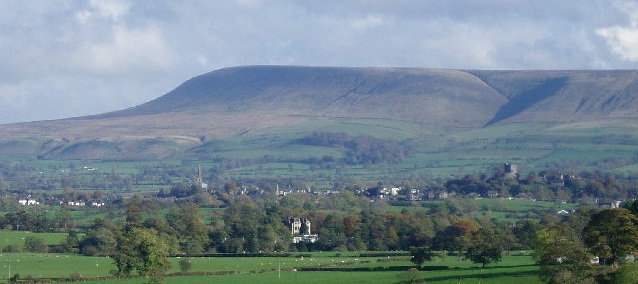 Grimshaw Origins
Grimshaw Origins
 Grimshaw Origins
Grimshaw Origins
Emergence of the Family Name near Grimsargh and Pendle Hill in Lancashire

Pendle Hill with Ribble River Valley in Foreground
The original location of the Grimshaw surname may have been between Grimsargh and Pendle Hill.
Source: http://www.yourlocalweb.co.uk/images/pictures/07/23/pendle-hill-and-the-ribble-valley-70668.jpg
The Grimshaw surname first appeared in Lancashire, apparently by 1000 AD, and perhaps earlier. There are two competing theories on the origin of the Grimshaw name - a "Celtic" and a "Viking" theory. In the Celtic theory, "Grimshaw" emerged simultaneously with -- and at the same location as -- "Grimsargh", which is located a few miles northeast of Preston. The names are associated with sun-worshiping Celts in the area west of Pendle Hill. In the Viking theory, "Grimshaw" is associated with the "grimr", a form adopted by the Norse god Odin to remain unrecognized when he descended to the earth to be among people.
Contents:
The "Celtic" Theory of the Origin of the Grimshaw Surname
Mavis Long's Research Associating "Grimshaw" with "Grimsargh"
The "Viking" Theory of the Origin of the Grimshaw Surname
| Webpage Credits |
Thanks go to Mavis Long for being willing to share the fruits of her Grimshaw research labors with the community of Grimshaw researchers.
| The "Celtic" Theory of the Origin of the Grimshaw Surname |
The Celtic theory is articulated in a historical study of the Pendle Hill area by James McKay1, which is presented on a companion webpage. McKay's study is based in large part on place-name analysis, associates the Grimshaw name with Grimsargh and Grindleton, which are located west of Pendle Hill near the Ribble River. For all three names, McKay makes the case that their associated locations were the sites of sun worship by Celtic Druids. The names were given to the Celtic locations by the Angles and Saxons who invaded the area after the Romans withdrew in the early 400s A.D.
According to McKay, the terms “grim” and “grin” are “forms of the one root word (that) signify the sun, when the term is used for that celestial luminary as a divinity, or as the object or symbol referred to in divine worship” (p. 101-102). McKay asserted that the names were given by the Angles and Saxons when they occupied lowlands that they had seized from the Celts (Segantii). The uplands (including the sites where the Druidic worship took place) were still held by the fierce Celts and could not be taken.
Grimsargh and Grindleton, as well as other similar Celtic places referenced by McKay – Goosnargh and Tootall (Tootle) Heights – are still in existence today west and south of Pendle Hill. The original location of Grimshaw near Pendle Hill, however, is apparently not known. McKay presumes a separate location for Grimshaw from Grimsargh, but presents no data to support the presumption except for the following statement: "Grimshaw" - not an uncommon name around Pendle Hill - since "shaw" signifies a wood or grove, becomes readily "the Wood or Grove of the Sun."
| Mavis Long's Research Associating "Grimshaw" with "Grimsargh" |
Mavis Long has conducted extensive research on many different aspects of early Grimshaw family history throughout the area where the family originated around Pendle Hill, Preston and Blackburn. Her research in the earliest origins, which is described on a companion webpage, is benefiting Grimshaw researchers everywhere.
Mavis' research indicates that the Grimshaw surname and families originated at Grimsargh, where the many variants of the name "Grimsargh" include some that are very close to "Grimsagh" or "Grimshagh", which are variants of the Grimshaw name (in the numerous variants of "Grimsargh" and "Grimshaw", about the only distinction between the two sets of names is the occurrence of the second "r" in Grimsargh and not in Grimshaw). The village of Grimshargh has been well described by Hindle2
The earliest recorded Grimsargh individual identified with that location was Gilbert de Grimsargh, whose exact date is unknown. However, he preceded William de Grimshaw, who is dated at about 1242. From Grimsargh, the Grimshaws (or their predecessors, Grimsaghs or Grimshaghs) apparently migrated northeast to Edisford and southeast to Eccleshill. A branch also appeared quite early at Cliviger, which is east of Pendle Hill, near Burnley.
Mavis' research has found the earliest records for Grimshaws at three locations in the area around Preston, Clitheroe and Blackburn:
A. Grimsargh (northeast of Preston)
B. Edisford (southwest of Clitheroe)
C. Eccleshill (southeast of Blackburn)
Mavis has provided the following summary of Grimshaw records for Grimsargh, Edisford and Eccleshill:
LOCATIONS OF MEDIEVAL GRIMSHAWS 1242 – 1372
The following chart, compiled from many ancient documents, identifies three locations plus dates and names for the earliest Grimshaw’s found in Lancashire records. It is possible no earlier documents exist.
| GRIMSARGH | EDISFORD | ECCLESHILL per Whitaker |
| Gilbert ??? | Walter ??? | Walter ??? (4
sons) William Richard Adam Henry (1263) 1284 |
| William (1221) 1242-1297 | Richard son of Walter. | Adam (1292) 1313; son of Henry |
| Thomas (1261) 1282 & 1284 (& had wife Agnes) | William (1253) 1274-1294; son of Rich. | Henry (1296) 1317; son of Adam |
| John (1261) 1282-1313; son of Thos. | Adam (1273) 1294; son of Willam; died bef. 1316. | Adam (1321) 1342; son of Henry, m. Cecily de Clayton |
| Gilbert (1263) 1284-1292; son of Thos. | Ellena (1295) 1316; daughter of Adam | Henry (1351) (1372-6) |
| William (1311) 1332-1362 |
The earliest recorded Grimshaw appears at Grimsargh - ‘Gilbert’ (without date) followed by William 1242 who held the Manor of Grimsargh in thenage. The Grimshaws of Edisford and Eccleshill are a little later.
The first William de Grymeschargh could be the common link between the three locations but, to date, no document has been found naming either his father or son to help connect these. It is clear from the numerous documents that do identify him, far more than for any other person named Grymeschargh during these years, that he held a prestigious position within his society. He is named in the list of ‘enquirers of the Wapentake of Amounderness’ in 1242 (Scutage of Gascony); is listed as a ‘Free and Liege man of Preston’ in 1243; held the Manor of Grimsargh and ‘attested’ at twelve Inquests & Inquisitions.
The social strata of the day included: thanes, freemen, drengs & villeins, bordars, & serfs. (per Hindle p.27)
Dictionary definitions:
theng: An Anglo Saxon who held land from the King or Noble in return for certain services.
thane: One holding land of the king or other superior by virtue of military service with rank between ordinary freemen and hereditary nobles.
thenage: The holding of land of the king by virtue of military service.
scutage: Money paid to the Crown by feudal landowners in lieu of personal services.
freeman: One who is not a slave or serf, not subject to tyranny or usurped dominion, one who has freedom of borough or city.
liege: (of superior), entitled to receive, bound to give, feudal service of allegiance.
liege lord: feudal superior, sovereign.
Companion webpages on Walter Grimshaw of Edisford and Walter Grimshaw of Eccleshill have been prepared. The Grimshaws of Cliviger were apparently the sons of Walter Grimshaw of Eccleshill.
| The "Viking" Theory of the Origin of the Grimshaw Surname |
The early Viking origin of the Grimshaw surname, described on a companion webpage, has a great deal of currency among Grimshaw researchers, but is apparently an inferior theory to the Celtic theory described above. The proposed Viking origin has been documented by Rogers2:
Viking attitudes to the whole natural world seem to show a people, still close to nature, who combine superstitious veneration with a down-to-earth practical respect for the countryside. The special tree or grove often had some significance as a sacred place…. Christianity sometimes stands accused of pessimism because of its emphasis on a happy life after death may lead its followers to accept present miseries; nevertheless, it seems raging optimism, when compared with the ancient Viking belief in prospect of the ultimate extinction of mankind, in a cataclysmic struggle of good versus evil: evil, in the form of a snake coiled round the world-tree, would prevail, and final darkness would prevail, and final darkness settle on all in a ‘twilight of the gods’.
It would be absurd to try to assess to what extent Vikings adhered to the letter of such beliefs, but they colour Viking place-names. Grimr, a recurrent personal name in place-names, had ambivalent overtones; sometimes it seems to have signified the god Odin, thought to go about disguised in a grim mask. At other times it seems to stand as a nickname for the devil. Possibly some forlorn unpromising site was dubbed ‘devil’s settlement’, or the place might have pagan associations…. (Grimr) forms an element of –
, and GRIMTHORPE – Grimr’s outlying farm.GRIMSHAW - Grimr’s wood
| Hall of Names Information on Grimshaw Origins |
The Hall of Names4 provides the following additional information on the early origins of the Grimshaws:
History researchers have examined reproductions of such ancient manuscripts as the Domesday Book (1086), the Ragman Rolls (1291-1296), the Curia Regis Rolls, The Pipe Rolls, the Hearth Rolls, parish registers, baptismals, (and) tax records. They found the first record of the name Grimshaw in Lancashire where they were seated from very ancient times at Grimshaw, some say well before the Norman Conquest and the arrival of Duke William at Hastings in 1066 A.D.
…this notable English family name, Grimshaw, emerged as an influential name in the county of Lancashire where the name was anciently found….. The Grimshaws were led to join King Richard in 1190 on his Crusade to Jerusalem and later, during the 14th century, the Grimshaws were amongst the English armies who fought back invasions from Scotland.
| References |
1McKay, James, 1888, Pendle Hill in History and Literature: Preston, Lancashire, England, Henry Davies & Co., 538 p.
2Hindle, David, 2002, Grimsargh - the Story of a Lancashire Village: Lancaster, Lancashire, Carnegie Publishing Ltd., 291 p.
3Rogers, K.H., 1991, Vikings & Surnames: York, England, William Sessions Limited, p. 15-16.
4Hall of Names, 1994, The Ancient History of the Distinguished Surname Grimshaw: Hall of Names, Inc., Certification No. 943320-12.10H-11680, 1 p.
Webpage posted April 2011.
